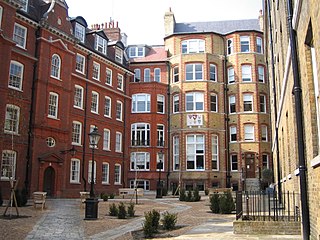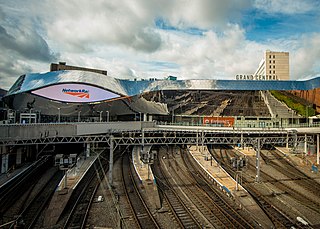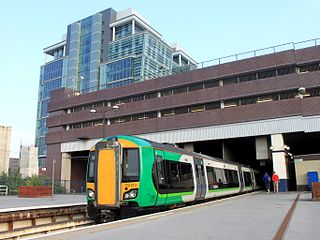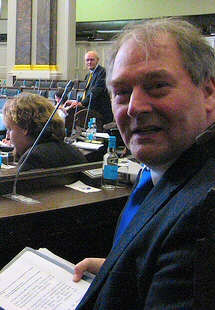Related Research Articles

West Midlands is a ceremonial county in the larger West Midlands region of England. A landlocked county, it is bordered by Staffordshire to the north and west, Worcestershire to the southwest, and is surrounded by Warwickshire to the east and southeast. The largest settlement is the city of Birmingham.

In the United Kingdom and some Commonwealth countries, a King's Counsel is a senior trial lawyer appointed by the monarch of the country as a 'Counsel learned in the law'. When the reigning monarch is a woman, the title is called Queen's Counsel.

The Honourable Society of the Middle Temple, commonly known simply as Middle Temple, is one of the four Inns of Court exclusively entitled to call their members to the English Bar as barristers, the others being the Inner Temple, Gray's Inn and Lincoln's Inn. It is located in the wider Temple area of London, near the Royal Courts of Justice, and within the City of London. As a liberty, it functions largely as an independent local government authority.

The Honourable Society of the Inner Temple, commonly known as the Inner Temple, is one of the four Inns of Court and is a professional association for barristers and judges. To be called to the Bar and practise as a barrister in England and Wales, a person must belong to one of these Inns. It is located in the wider Temple area, near the Royal Courts of Justice, and within the City of London. As a liberty, it functions largely as an independent local government authority.

Birmingham New Street, also known as New Street station, is the largest and busiest of the three main railway stations in Birmingham city centre, England, and a central hub of the British railway system. It is a major destination for Avanti West Coast services from London Euston, Preston, Glasgow Central and Edinburgh Waverley via the West Coast Main Line, the CrossCountry network, and for local and suburban services within the West Midlands; this includes those on the Cross-City Line between Lichfield Trent Valley, Redditch and Bromsgrove, and the Chase Line to Walsall and Rugeley Trent Valley. The three-letter station code is BHM.

Birmingham Snow Hill, also known as Snow Hill station, is a railway station in Birmingham City Centre. It is one of the three main city-centre stations in Birmingham, along with Birmingham New Street and Birmingham Moor Street.

The Inns of Court in London are the professional associations for barristers in England and Wales. There are four Inns of Court: Gray's Inn, Lincoln's Inn, Inner Temple and Middle Temple.

The West Midlands is one of nine official regions of England at the first level of International Territorial Level for statistical purposes. It covers the western half of the area traditionally known as the Midlands. The region consists of the counties of Herefordshire, Shropshire, Staffordshire, Warwickshire, West Midlands and Worcestershire. The region has seven cities; Birmingham, Coventry, Hereford, Lichfield, Stoke-on-Trent, Wolverhampton and Worcester.

Birmingham has seen 1400 years of growth, during which time it has evolved from a small 7th century Anglo Saxon hamlet on the edge of the Forest of Arden at the fringe of has early Mercia into a major city. A combination of immigration, innovation and civic pride helped to bring about major social and economic reforms and create the Industrial Revolution, inspiring the growth of similar cities across the world.
Modern-day Birmingham's cultural diversity is reflected in the wide variety of religious beliefs of its citizens. 70% of residents identified themselves as belonging to a particular faith in the 2021 Census, while 24% stated they had no religion and a further 6% did not answer the question.

The city of Birmingham, in England, is an important manufacturing and engineering centre, employing over 100,000 people in the industry and contributing billions of pounds to the national economy. During 2013, the West Midlands region as a whole created UK exports in goods worth £19.6 billion, around 8.73% of the national total, however, exports fell by 14.5% compared to 2012 and there is a trade deficit of £5.6 billion. Output was forecast to grow from 2007 to 2012, but the city's economy flat-lined in from 2007 to 2009, following the economic crisis which affected the economies of countries around the world.

The Temple is an area of the City of London surrounding Temple Church. It is one of the main legal districts in London and a notable centre for English law, since the middle ages to the present day. It consists of the Inner Temple and the Middle Temple, which are two of the four Inns of Court and act as local authorities in place of the City of London Corporation as to almost all structures and functions. Before the establishment of these Inns of Court, the Temple area was the precinct given to the Knights Templar until they were suppressed in 1312, but the area has retained the name from that time. It became a centre of the legal profession soon thereafter.
Faiz-ul-Aqtab Siddiqi is a Muslim scholar, principal of the Hijaz College, National Convenor of the Muslim Action Committee (MAC), Secretary General of the International Muslims Organisation, Grand Blessed Guide of the Naqshbandi Hijazi Sufi Order and a barrister at law.

Michael John Whitby, Baron Whitby is an English Conservative Party politician and former leader of Birmingham City Council, a post he held from June 2004 to May 2012. Until 2014 he was one of three councillors representing the Harborne ward in the west of the city. He was formerly a Councillor on Sandwell Metropolitan Borough Council. It was announced that he would be made a working peer by David Cameron on 1 August 2013.

Birmingham is a city and metropolitan borough in the metropolitan county of West Midlands in England. It is the second-largest city in Britain – commonly referred to as the second city of the United Kingdom – with a population of 1.145 million in the city proper. Birmingham borders the Black Country to its west and together with its city of Wolverhampton and towns including Dudley and Solihull to the south-east, forms the West Midlands conurbation. The wider metropolitan area has a population of 4.3 million, making it the largest outside of London.
The city of Birmingham, England is home to an evolving media industry, including news and magazine publishers, radio and television networks, film production and specialist educational media training. The city's first newspaper was published in 1732.
The legal services sector of the United Kingdom is a significant part of the national economy; it had a total output of £22.6 billion in 2013, up from 10.6 billion in 2001, and is equivalent to 1.6% of the country's gross domestic product for that year. The sector has a trade surplus is £3.1 billion in 2013 and directly employees 316,000 people, two-thirds of whom are located outside London. The UK is the world's most international market for legal services. It allows virtually unrestricted access for foreign firms, resulting in over 200 foreign law firms with offices in London and other cities in the UK. Around half of these are US firms, with the remainder mainly from Europe, Australia and Canada. The UK legal market has a strong global position due to the popularity of English law. Some 27% of the world's 320 legal jurisdictions use English Common law.

Nwabueze Jaja Wachuku Nwokolo, a royal princess of Ngwaland, is a Nigerian United Kingdom based lawyer who is council member at Law Society of England and Wales; including being a director and board chair of Great Britain's BSN: Black Solicitors Network, the largest membership organisation of its kind in Europe. Nwokolo is a member of Law Society of England and Wales' Minority Ethnic Concerns Group. Also, she sits on the RAB: Regulatory Affairs Board of the Law Society.
Sir Alistair William Orchard MacDonald, styled The Hon. Mr Justice MacDonald, has been a judge in the Family Division of the High Court of England and Wales since 2 June 2015. As a barrister he specialised in child protection.

The Cambridge University Law Society is the educational and representative body of undergraduate law students at the University of Cambridge. Founded in 1901, and with an estimated 2,000 active members, it is the largest United Kingdom student-led law society and among the largest student-run law societies in the world. It founded the Cambridge Law Journal as a student publication in 1921, today the longest-running university law journal in the United Kingdom and the principal publication of the Faculty of Law, Cambridge.
References
- ↑ Paul Farrow Takes The Helm At Birmingham Law Society, archived from the original on 10 March 2007, retrieved 10 March 2007. Final sentence of Press Release.
- ↑ Follis, Richard (2006), "The Times They Are A-Changin'", Birmingham Law Society Bulletin February 2006 (PDF), archived from the original (PDF) on 27 September 2007, retrieved 10 March 2007
- ↑ Foster, Andy (2005), Pevsner Architectural Guides - Birmingham, London: Yale University Press, p. 121, ISBN 0-300-10731-5
- ↑ Birmingham Law Society , retrieved 10 March 2007. Infobox at bottom of page.